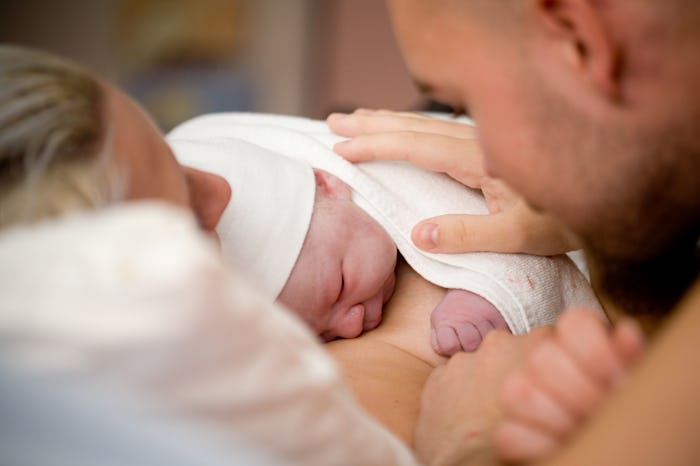It's well-established that bringing home a new baby is stressful for all parents, and when that baby is born prematurely, it's often even harder. But a new study has found that dads get more stressed about their premature babies than moms, when measuring through both self-reported tests and physiological ones. The study, led by Dr. Craig Garfield, associate professor of pediatrics and medical social sciences at Northwestern University, concludes that the "experience of bringing a [very low birth weight] infant home from the NICU varies by sex," but is sex really the variable, or is it gender?
Garfield told the Chicago Tribune that juggling work with added responsibilities at home may play a role, but of course, many moms also have to go back to work soon after their child is born, as well. AnnaMarie Rodney, owner of Chicago Family Doulas, offered the Tribune another possible factor: she said that in her experience, women tend to start preparing for parenthood as soon as they get pregnant, while their male partners may not, making for a tougher adjustment when the baby arrives. She added that during pregnancy, her clients' husbands don't think a baby will change their lives, but once the baby arrives, "it's an additional stress, and they really don't know what to do with it."
True, Rodney's anecdotal evidence might be a bit skewed, since women with husbands who are ¯\_(ツ)_/¯ about fatherhood are probably more likely to hire a stranger to support them during pregnancy and delivery. But our society still views parenthood largely as "women's work." Look no further than the cringe-inducing use of the term "babysitting" to refer to a father taking care of his own child, or the countless dads who have gone viral for simply knowing how to style their daughters' hair. If you prefer another personal anecdote: my maternity ward nurse was absolutely floored when she witnessed my husband changing his son's diaper, telling us he was literally the first she'd ever seen to do so (and she was no rookie).
Garfield's study followed 86 participants (43 female-male couples), and administered three tests over the course of two weeks: the day before the baby was discharged, and then again one, five, and 14 days after coming home. Parents' saliva was tested for the stress hormone cortisol, and they also completed two self-reported surveys, the "Perceived Stress Scale" and the "Parenting Sense of Competence Scale." Everyone's baseline was the same, but while moms' stress levels went down over those two weeks, dads' continued to rise. Garfield told Northwestern Now that the fathers salivary test results revealed that they were actually more stressed than they reported in their surveys, which he hypothesized could be attributed to the men not being in touch with their feelings.
But did the fathers not realize how stressed they really were, or were they ashamed to admit it? Society tells men, particularly fathers, that their role is to be strong for their wives and children, to be the protector and the breadwinner. One 2011 meta-analysis of 43 studies involving 28,004 participants found that about 10 percent of fathers suffer from postpartum depression, yet most resources describe it solely as a women's problem.
Although the study didn't examine stress levels in parents of full-term babies, Garfield acknowledged that those parents also experience stress (duh). To address the gender disparity, he recommends encouraging dads to develop parenting skills to increase their confidence, and letting them go to the gym or out with friends to relax. In other words, dads should be parents, just like moms, and if they are, they should get breaks, just like moms. Yes! We're getting there! But they also need paternity leave, stigma-free mental health support, and most importantly, freedom from outdated gender roles. The patriarchy doesn't just harm women; it harms everybody.
Check out Romper's new video series, Bearing The Motherload, where disagreeing parents from different sides of an issue sit down with a mediator and talk about how to support (and not judge) each other’s parenting perspectives. New episodes air Mondays on Facebook.
